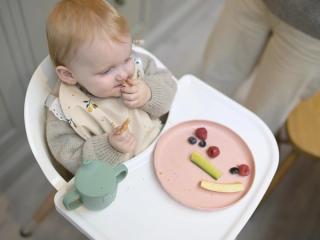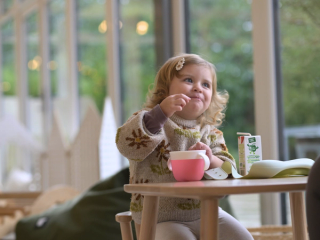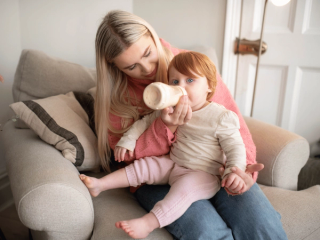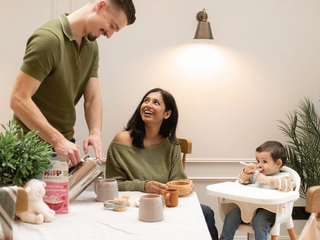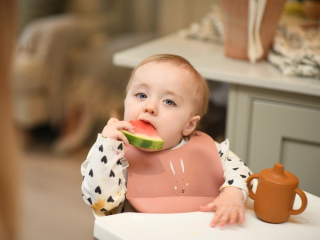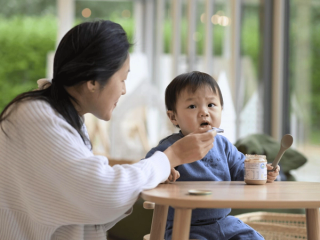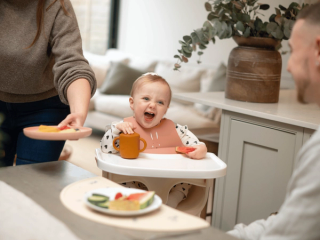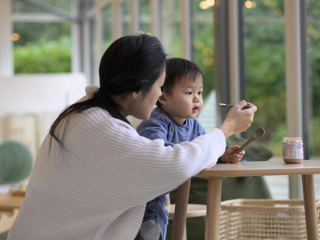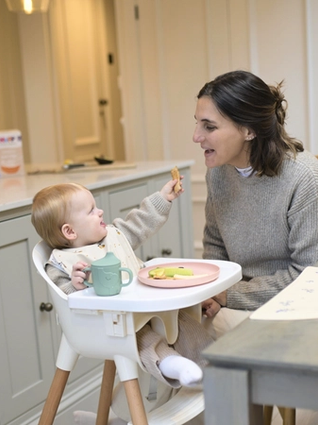
- Home
- Advice Hub
- Toddler
- Toddler Feeding
- How To Teach Your Toddler To Feed Themselves
How to teach your toddler to feed themselves
Learn tips to help your toddler master self-feeding skills, encouraging independence and confidence at mealtimes with fun, nutritious food options.
Why is it important for toddlers to feed themselves?
At what age should children start to feed themselves?
What foods should you start with?
What to expect when children are learning to feed themselves
At what age will my toddler start using a spoon or a fork?
Tips for successful self-feeding
How to Deal with Mess
As babies develop, so do their feeding skills. All babies are different, some pick up new feeding skills quickly, while others need a bit more time to practise and really adjust to this new way of doing things.
Encouraging your toddler to feed themselves is an exciting and essential part of their development. There’s no set timelines or rules for the way you should do things, but it’s good to allow your little one to start feeding themselves as soon as they are able. At HiPP, we understand that the journey of self-feeding can be messy and challenging, but it's a vital step towards becoming an independent eater.
Why is it important for toddlers to feed themselves?
Children generally love being given autonomy but self-feeding is more than being enjoyable it has positive effects on other areas too:
- Build independence: self-feeding empowers toddlers to make choices about their food, giving them a sense of autonomy and confidence.
- Builds fine motor skills: picking up food and using utensils helps to develop the coordination and skills necessary for later tasks.
- Encourage healthy eating habits: when children choose their own food and learn to manage portions, they are more likely to develop a positive relationship with food and create healthy eating patterns.
At what age should children start to feed themselves?
Your baby can begin self-feeding right from the start of weaning. In the UK it is recommended that finger foods are offered alongside any spoon feeding you are doing from 6 months. At this stage you should be offering large pieces of food that are a similar length to an adult finger and 1-2 fingers wide.
Somewhere between 8-10 months of age your baby will develop a pincer grip, meaning they can pick foods up between their thumb and forefinger. At this stage, they’ll be able to get much smaller foods into their mouth, so make sure you give them lots of exciting things to practice with! Be sure to be mindful of choking, though (you can read more about gagging and choking here).
Most babies begin to show more of an interest in self-feeding between 9 to 12 months. However, every child develops at their own pace. You may be wondering when to stop spoon feeding your baby; and again, there’s no set time; once your baby has mastered feeding themselves and is showing an interest in doing it, let them!
What foods should you start with?
When introducing self-feeding with finger foods at the start of weaning, start with soft, easily manageable foods. You can always spread some of their puree or mashed foods onto some finger foods to get two things in at once and to spark a little interest in sucking finger foods if your baby isn’t sure what to do at first.
- Soft fruits: Banana slices, avocado, or cooked apples
- Vegetables: broccoli florets, well-cooked carrot sticks
- Carbohydrates: well cooked pasta pieces, toast fingers with nutritious toppings (hummus, cream cheese, mashed banana)
- Protein: omelette fingers, small pieces of soft-cooked chicken or fish
What to expect when children are learning to feed themselves
As your toddler starts to feed themselves, expect a range of behaviours:
- Experimentation: toddlers are naturally curious and may try different ways to eat, from using their hands to trying out utensils in weird and wonderful ways!
- Mess: Self-feeding is often messy. Expect spills, dropped food, and smeared faces as your little one learns to navigate the process. Try to avoid cleaning them up mid meal; just let them explore and clean them up at the end.
- Frustration: learning to self-feed, especially when it doesn’t go as planned can be frustrating for little ones. Maybe the food keeps falling off the spoon before it gets to their mouth, or they are chasing foods around the plate with a fork. Be patient and encourage them to keep trying. If it gets too much, just tell them to get involved with their hands rather than stepping in and doing it for them.
At what age will my toddler start using a spoon or a fork?
By around 15 to 18 months, many toddlers can start using cutlery like spoons with increasing proficiency. It’s essential to observe your child's readiness, as some may prefer to be spoon-fed for a little longer or to simply use their hands; which is fine as it helps them to learn about and understand the foods they are eating. By around the age of two your little one will probably be able to hold cutlery in both hands, probably a spoon and fork, and will continue to build on those skills all through childhood.
Tips for successful self-feeding
- Use Deep Bowls:choose deep bowls to help prevent spills and make it easier for your toddler to scoop up food. The sides of the bowl can provide support as they learn to use their utensils.
- Ergonomic Cutlery: ergonomic cutlery is specially designed for little hands and often have softer grips or very small handles that make it easier for your child to hold and use them effectively.
- Be Patient and Supportive: celebrate their successes, and offer gentle guidance when they struggle. Encourage them to try again and praise their efforts to boost their confidence.
- Don’t expect too much: allow your little one to use their hands when they are struggling. If it is too hard, they may start to avoid eating certain foods for fear of struggling with feeding themselves.
- Create a Comfortable Eating Environment: ensure your toddler is seated comfortably in a highchair or at the table with good posture. This support can help them focus on self-feeding.
How to Deal with Mess
Mess is an inevitable part of weaning, but especially self-feeding! It can be hard, but sometimes we’ve just got to lean into that problem and see it as part of learning a new skill that will eventually make your life as a parent easier.
- Catch the dropped food: use a shower curtain, mat or even an old towel underneath the highchair to catch spills.
- Dress for mess: use a bib that covers their clothing well and is easy to clean and don’t put your baby in expensive clothes (until they’re a teenager!).
- Stay calm: approach the mess with a sense of humour. Your toddler is learning, and it’s all part of the process. Reacting or getting stressed may have a negative impact on the enjoyment of the meal.
Teaching your toddler to feed themselves is an important step toward independence and self-confidence. Remember, every child is different, and some may take longer than others to master this skill. Be patient, provide encouragement, and celebrate their efforts, no matter how messy they may be. Before you know it, your little one will be well on their way to becoming an independent eater!
